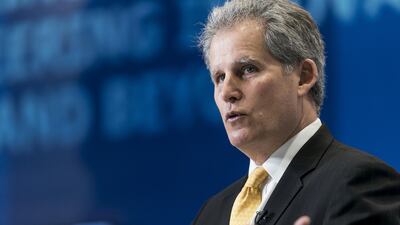The world economy is gaining strength but structural issues such as weak wage growth and rapid asset appreciation need to be addressed, an IMF official said on Monday.
"The bottom line is that the cyclical recovery in the global economy is going from strength to strength," IMF first deputy managing direct David Lipton said in a speech to the Asian Financial Forum.
_________
Read More:
IMF forecasts economic recovery for Middle East economies in 2018
IMF slashes UK growth forecasts amid Brexit uncertainty
_________
In October, the IMF boosted its forecasts for global growth for 2017 but said that many countries were plagued by lacklustre productivity as evidenced by weak inflation.
The IMF said it expected global GDP to advance by 3.6 per cent in 2017 and 3.7 per cent in 2018, a 0.1 percentage point increase for both years from previous forecasts.
While generally upbeat, the IMF warned however in its global economic outlook that years of cheap financing had stretched asset valuations, which means that some markets should be watched closely by economic policy makers. The fund also warned that policy makers in China, the world's second biggest economy, and elsewhere would need to rein in credit expansion to minimise risks of a sharp slowdown.
"The signs point to faster growth across all regions," said Mr Lipton.
"That said, we must also recognise that the global economy is in a late stage of the long and gradual recovery from the global financial crisis. With economic slack in advanced economies diminishing, it is not clear how long the good news will continue."
Mr Lipton said the key challenge for China was to ensure that its role of generating growth and financing remains on a path that is both beneficial for it and the global economy. China can do this by continuing to re-balance growth towards consumption as well as safeguarding financial stability by reining in credit growth to make sure it does not undermine economic and social progress, he said. It should also continue to promote globalisation despite scepticism in the West of the value of free trade and ensure that it's also doing its best to comply.
"At the same time, we believe that effective and credible leadership in support of globalisation also requires a willingness to recognise and address one's own shortcomings," he said.
"That means China should be open to look at its own restrictions on trade and investment, which have generated criticism from some trading partners. It also means protecting intellectual property rights and reducing the distortions of industrial policy, overcapacity, and policies that favour state enterprises."

